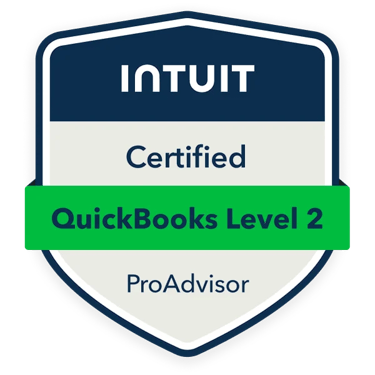Christopher Wilson
Bookkeeping vs. Accounting: What's the Difference and Why It Matters for Your Business
Learn the key differences between bookkeeping and accounting, how they work together, and why both are essential for small business success. Discover how Cilson Bookkeeping can help.
FEATURED GUIDES
8/16/20255 min read
The Plain-English Difference
Bookkeeping captures and organizes your day-to-day financial transactions, keeping your records accurate and current. Accounting uses those clean records to produce compliant reports, file taxes, and turn the numbers into clear guidance. Working with a professional bookkeeper ensures that your financial records are accurate, making accounting and business planning much easier. Understanding the difference between bookkeeping and accounting helps small business owners know who to turn to and when. Both are crucial for maintaining the financial health of your business, serving distinct yet complementary purposes.
What Is Bookkeeping?
Bookkeeping is the process of recording all financial transactions systematically and accurately. Bookkeepers track sales, expenses, invoices, payments, payroll, and other financial transactions. Their goal is to keep accurate, organized records, often using cloud-based accounting software like QuickBooks Online. Modern bookkeeping involves:
Transaction Recording: Capturing every business transaction in real time.
Bank Reconciliation: Matching bank statements with recorded transactions.
Expense Categorization: Organizing expenses for tax optimization and reporting.
Invoice Management: Creating and tracking customer invoices and payments.
Payroll Support: Coordinating with payroll processors and posting journal entries.
Bookkeeping can be single entry (like a checkbook) or double entry (with debits and credits), but either way, it’s all about keeping your financial history up to date.
What Is Accounting?
Accounting takes the data from bookkeeping and uses it to analyze, report, and advise. Accountants prepare financial statements, look for trends, calculate depreciation, and help with financial forecasting and strategy. Accounting transforms raw financial data into actionable business insights. Key accounting functions include:
Financial Statement Preparation: Creating profit & loss statements, balance sheets, and cash flow statements.
Tax Preparation and Planning: Ensuring compliance and optimizing tax strategies.
Financial Analysis: Identifying trends, ratios, and performance metrics.
Business Advisory: Providing strategic guidance based on financial data.
Compliance Management: Ensuring adherence to accounting standards and regulations.
Summarize, interpret, and report on the transactions
Periodic close, year-end, and planning
Accounting
Adjusting entries, depreciation/amortization, inventory/costing methods, financial statement prep, tax returns, assurance/audit work
GAAP/tax-ready financials, tax filings, and higher-level analysis
Comparison of Bookkeeping vs. Accounting
Record day-to-day transactions
Ongoing
Bookkeeping
Categorize income/expenses, AR/AP, bank/credit card reconciliations, payroll postings, sales tax tracking, 1099 prep
Clean, reconciled books and management reports
Core focus:
Time horizon:
Typical tasks:
Outputs:
Core focus:
Time horizon:
Typical tasks:
Outputs:
Bookkeeping builds the foundation. Accounting turns it into action. If your records aren’t correct, your insights won’t be either.
Key Insight

Bookkeepers lay the groundwork by keeping accurate records. Accountants depend on this clean data to produce reliable reports. Without solid bookkeeping, even the best accountant may struggle to provide meaningful insights or prepare accurate tax returns.
Bookkeeping creates the foundation with accurate transactional records.
Accounting builds upon this foundation to create reports and insights.
Business decisions are made based on accounting analysis.
Results flow back through bookkeeping as new transactions.
What "Clean Data" Actually Means
When we say accountants need "clean data," there's a dramatic difference between messy and clean bookkeeping. Messy bookkeeping looks like transactions recorded weeks or months late, expenses categorized incorrectly (like office supplies listed as equipment), personal and business expenses mixed together, bank accounts that haven't been reconciled, missing receipts, and duplicate entries scattered throughout the records.
Clean bookkeeping, on the other hand, means all transactions are recorded promptly and accurately, expenses are properly categorized for tax purposes, business and personal expenses are clearly separated, all accounts are reconciled monthly, supporting documentation is organized and accessible, and there are no duplicate or missing entries.
The Positive Cycle of Good Bookkeeping
When bookkeeping is done right, it creates a positive cycle that benefits your entire business. Clean records mean your accountant can focus on analysis instead of cleanup, which leads to more valuable insights and tax optimization. This results in lower costs because less time is spent on cleanup, meaning lower accounting fees. Better analysis leads to better business decisions based on reliable financial information, which improves business performance. Success provides more resources for continued professional bookkeeping, and the cycle continues.
A Bookkeeper's Role During Tax Season
Many people think bookkeepers file tax returns, but that's typically not their role. Tax preparation and filing are most often handled by CPAs, enrolled agents, or tax preparers who have specific credentials and legal authority to represent you before the IRS. However, bookkeepers play a critical role in making tax preparation possible and achieving optimal outcomes. Bookkeepers generally don’t file taxes, but they make sure your records are tax-ready:
Proper Categorization: Ensure income and expenses are correctly classified for tax optimization.
Account Reconciliation: Verify all bank and credit card accounts are balanced.
Financial Statement Preparation: Generate profit & loss statements, balance sheets, and cash flow reports.
Error Detection: Identify and correct discrepancies before CPA review.
Documentation Organization: Compile supporting documentation for tax deductions and credits.
CPA Collaboration: Provide clean, organized data in formats CPAs expect.
With a reliable bookkeeper, tax preparation becomes smoother, less stressful, and often results in better tax outcomes due to proper expense categorization and documentation.
How Bookkeeping and Accounting Work Together
Bookkeeping is about tracking. Accounting is about interpreting. Both are necessary for business success. Clean records lead to better decisions, smoother tax preparation, and peace of mind. And with expert help like Cilson Bookkeeping, it's easier than ever to stay on track.
In Summary
Ready to Trade Bookkeeping Stress for Strategy?
Cilson Bookkeeping delivers personalized bookkeeping, accounting, and business advisory services, all at straightforward flat-rate monthly pricing. Whether you need help with day-to-day bookkeeping or specialized industry-specific solutions, Cilson provides comprehensive support tailored to your unique needs, empowering your business to grow and succeed.
No pressure, no credit card, just a 15 to 30-minute chat.
Frequently asked questions
Can I have both a bookkeeper and a CPA/EA?
Yes, this arrangement is ideal. Bookkeepers ensure your financial records remain accurate and up to date, supporting seamless day-to-day decision making. Meanwhile, CPAs and EAs focus on tax strategy, compliance, and filings, providing expert tax guidance for long-term financial success. Two sets of eyes mean fewer errors, faster tax prep, and lower overall cost by matching work to the right expert.
Can software replace a bookkeeper?
While software can help automate certain bookkeeping tasks, like categorizing transactions, human expertise remains vital for maintaining accurate records and optimizing tax outcomes. A professional bookkeeper brings precision, manages exceptions, reconciles accounts, and offers strategic oversight—capabilities that software alone cannot provide.
When should I hire a bookkeeper?
Hire a bookkeeper early to establish solid systems and maintain clean records from the start, or as soon as managing your books takes 5–10+ hours a month. It’s also essential when operations become more complex, whether you’re handling payroll, contractors, inventory, job costing, multiple sales channels, or entities. If you’re falling behind on bookkeeping or find month-end tasks overwhelming, it’s time to get help.
Do bookkeepers help with taxes?
Bookkeepers may not file tax returns themselves, but they ensure your tax professional has everything needed to get the job done efficiently. Bookkeepers prepare monthly reports, provide a year-end tax package, and collaborate with tax professionals. However, they typically do not handle tax filings or offer legal or tax advice.
Explore Bookkeeping and Accounting Services
Discover the comprehensive services offered by Cilson Bookkeeping, tailored to meet the unique needs of professionals across various industries. From lawyers and realtors to consultants, architects, contractors, and other service providers, Cilson Bookkeeping delivers customized solutions designed to simplify your financial management.
EXPERTLY LED
Hi, I’m Christopher Wilson: Your one-on-one partner in profits, time, and peace of mind. I turned 20+ years of finance, audit, and hands-on ownership into one promise. I’ll treat your books with the same care I once gave billion-dollar balance sheets. Only now my focus is on you.
FAST FACTS & CREDENTIALS
Certified QuickBooks ProAdvisor bookkeeper. I keep up so you don’t have to.
BBA in Finance, Investment and Banking, University of Wisconsin–Madison.
I'm a two-time small business owner: retail wine shop and now Cilson Bookkeeping.
I serve clients nationwide from my home base in Littleton, CO: 100% remote, 100% personal.
About Cilson Bookkeeping


READY TO WORK TOGETHER?
I’d love to learn about your business goals and show you the simplest path to get there!
© 2026 Cilson Ventures, LLC d/b/a Cilson Bookkeeping. Original text, design, and graphics are copyright protected. Portions of this page include AI-assisted content that may be in the public domain.
Intuit, QuickBooks, and QuickBooks ProAdvisor are registered trademarks of Intuit Inc. used with permission under the QuickBooks ProAdvisor Agreement.
Get in touch
Address
Littleton CO 80125
Serving Denver & Colorado’s Front Range
Contacts
(720) 257-9065
CILSON BOOKKEEPING
